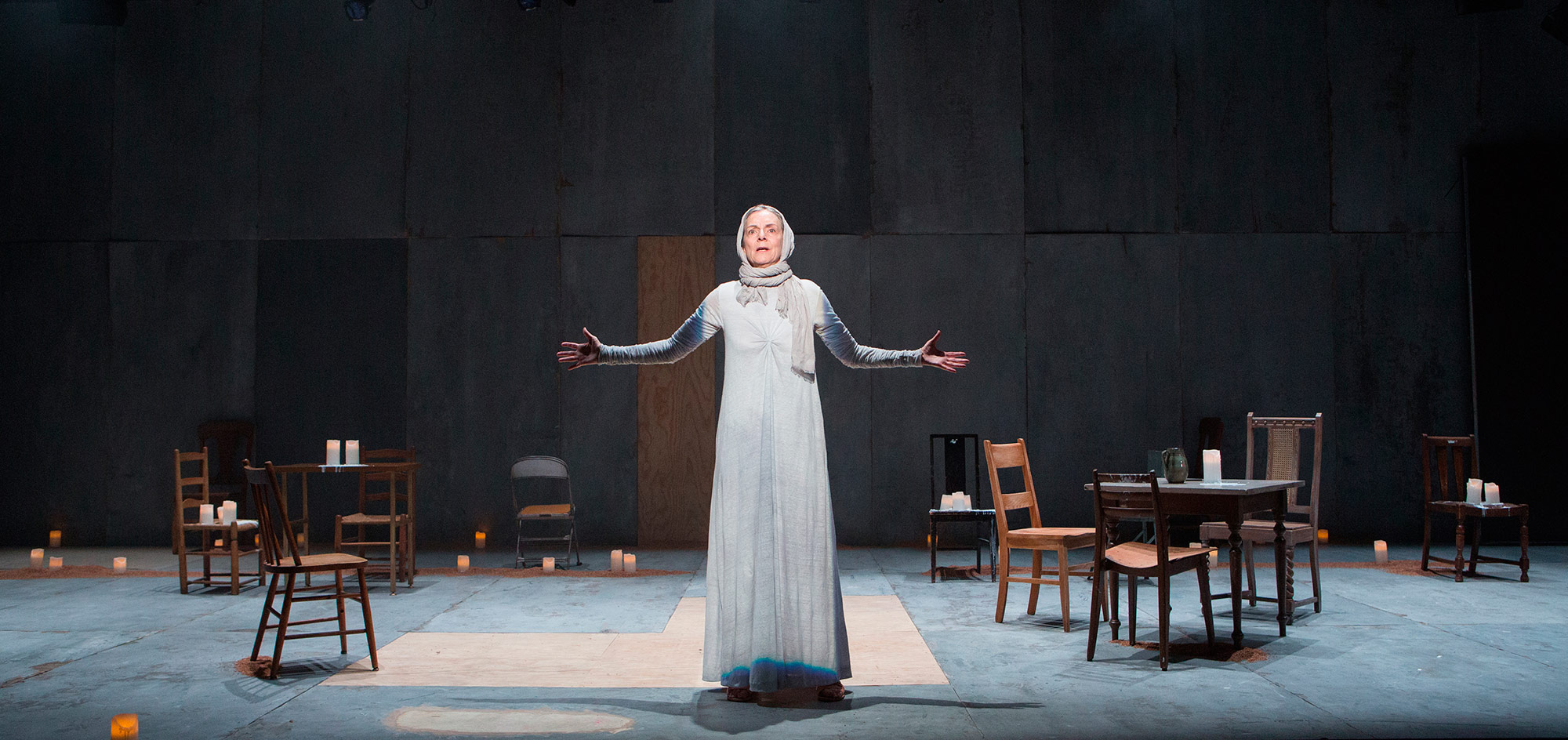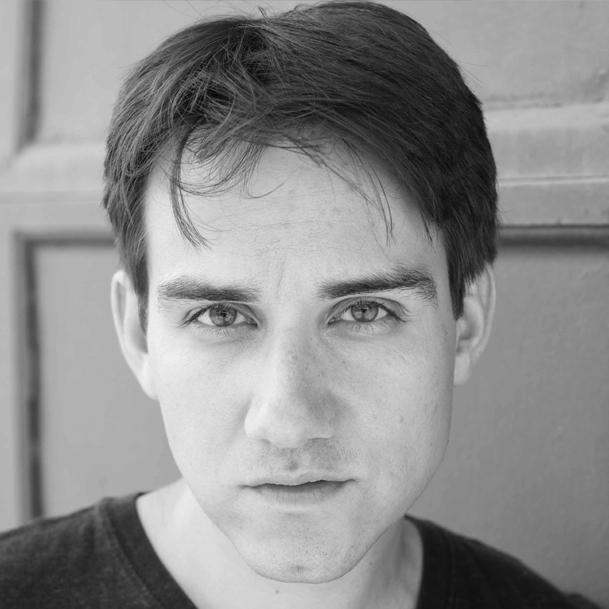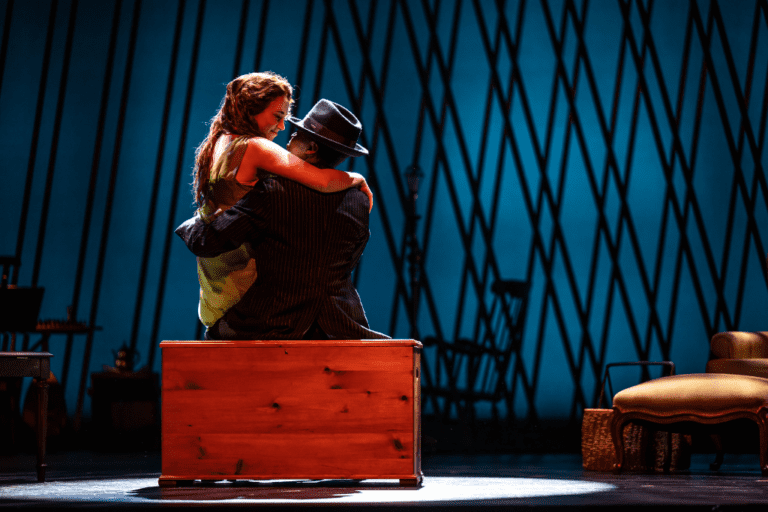All Our Heroes Are Flawed
Colm Tóibín wrote, “I could not have written [The Testament of Mary] without having been brought up a Catholic in Ireland. The play comes from belief… I knew that if you really wanted something, or were in trouble, then you could pray to Mary easier than you could pray to Jesus or to God Almighty. She had been mortal and powerless, she had known grief and sorrow, and she was now Queen of Heaven.”
The play, and the novella on which the play is based, has angered all kinds of people. Productions in America have been protested, and there are all kinds of reviews that excoriate Tóibín as a bitter, lapsed Catholic (and often use his homosexuality as the prime evidence of his nefarious anti-Catholic agenda…).
But it wasn’t all the controversy or the protests or the abusive emails that bothered him. “I was most uneasy,” he wrote, “about what was happening to me as I watched the play and indeed as I wrote it.” The Testament of Mary is a re-imagining of the Gospels, a story that the author used to believe and doesn’t anymore, and the importance of Mary’s testament lives in the place where belief and doubt meet.
This is what happened to me when I read it. To give that some context, I have to go back in time a bit.

Photo by Cylla von Tiedemann
I was brought up Roman Catholic. I had my first communion at age nine, went to church regularly, was conscripted to sing in the choir. I grumbled about it, like any kid who would rather be sleeping in on Sunday, but I still dragged myself there. And when I complained too much, my mother would tell me that it was worth spending at least an hour per week thinking about God, even if I couldn’t be bothered to pay attention to anything that was going on or being said. She was raised Catholic, and her belief was an important part of her identity. It was equally important for her to pass on to me and my siblings a spirituality that could be a significant part of our adult lives. When it came to “following the rules,” however, my mother was hardly a stickler. She refused to give special credence to anything the popes or priests might have to say about any issue if she thought they were “full of BS,” and she was always insistent that Jesus was not God, just a man who had wisdom worth sharing and behaviour worth emulating.
This had a profound impression on me, and I spent my years listening to the Catholic Mass with a slightly more critical ear, clocking what I agreed with and what I didn’t. Sometimes I would try saying aloud words that proclaimed strong belief just to see how they felt coming out of my mouth: “I believe in Jesus Christ His only son our Lord, who was conceived by the power of the Holy Spirit…” but then I’d get to the part that continues, “He was crucified under Pontius Pilate, died, and was buried. He descended to the dead, on the third day he rose again and was seated at the right hand of the Father. He will come again to judge the living and the dead,” and I would try remaining silent for everything that followed “he descended to the dead” and see how I felt afterwards.
My father had never been baptized, but felt similarly about the importance of cultivating a spiritual practice and having a weekly ritual. He liked to sing in the choir, probably more than he liked any other aspect of churchgoing. But he would always bring some theological book to read that he would crack open as soon as the priest began the homily. He couldn’t abide listening to the smallest trace of Catholic dogma, and, having never taken his first communion, he would remain sitting in the pews while everyone else went up for communion. This also made an impression on me: A person could sit in church and very clearly (and maybe somewhat obstinately?) refuse to participate at times and no heavenly lightning bolts smote him. No humans seemed to really care either, except possibly my mother who found the reading during the homily rude, even though she often found the homilies as tiresome and pedantic as he did. Still, I knew something in the service resonated with him when I heard him say aloud along with everyone else, “Lord I am not worthy to receive you, but only say the word and I shall be healed.”
When the Catholic elementary school I attended sent us home with permission letters for our parents to sign so that we could be confirmed, my parents asked if I wanted to be. I wasn’t sure, I replied, I didn’t really know what it meant, but it seemed pretty serious. They explained that it essentially meant that you declared that you believed that Jesus was the Son of God, and that you thought of yourself as a Christian. I must have looked noncommittal, because they told me that if I wasn’t sure, I didn’t have to do it—it was a decision only I could make. So I didn’t. I was never confirmed, and for the next twenty-odd years thought of myself as a kind of pseudo-Catholic.
For a pretty significant part of my twenties I found myself wanting to get more involved in the life of the church. Even though our church services were sleep-inducing, even though I found the hierarchy and hypocrisy of the Catholic Church revolting, even though there was no way I believed that Jesus of Nazareth was actually resurrected from the dead and literally was God, I still couldn’t fully leave behind the feeling that the old stories from the Bible, which were told week in and week out, were deeply important and had something vital to say about what it means to be human.
I suppose many practising Christians feel that way too, and had Catholicism been a more significant part of my identity growing up I might have found a way to live with my objections, as many do, and stick with it. As an adult I had come to agree with my parents that thinking about God at least once a week was time well spent so I did my best, but eventually I drifted away from it. I had lapsed before I’d even begun.
When I was thirty-one years old I surprised myself by converting to Judaism. Four years before that I had married a Jewish woman, and our relationship had immersed me in Toronto’s Jewish community. As she often jokes, there was no coercion—I converted without anyone’s encouragement or prodding. I suppose my parents were partly responsible, since the day they told me I didn’t have to be confirmed, they opened the door to me leaving Catholicism behind. But far more responsibility lies with the Jewish community I became a part of, a “traditional egalitarian,” politically progressive synagogue in downtown Toronto called The First Narayever Congregation. There, I not only discovered a community that I enjoyed being a part of, but a way of speaking and thinking about God and the Bible that I could seriously engage with without feeling like I had to endorse any dogmas I thought were either preposterous, superstitious, or bigoted. Now, as I move through life and people ask me if I’m Jewish, I say “yes.”

Photo by Cylla von Tiedemann
In the summer of 2014 I heard Colm Tóibín talking about the novella The Testament of Mary on the radio, and during that interview I learned that it had begun as a play before he expanded it into a novella, followed by a new version of the play that was produced on Broadway. My hybrid Catholic-Jewish background makes me particularly interested in stories that bring to life the first century world where early Christianity and Second Temple–era Judaism meet. Also, I always found stories that take biblical figures and imagine their humanity doubly appealing. Judaism has a substantial tradition of pointing out the fully rounded humanity of its Biblical heroes: pettiness, jealousies, mistakes, and failures stand right alongside all the virtuous behaviour. I always enjoyed stories where this was done with Christian figures—Martin Scorsese’s film adaptation of the Nikos Kazantzakis novel The Last Temptation of Christ is maybe one of the most popular, as well as a highly contentious example, of this genre (and also an excellent film in my opinion). When I heard Colm speaking about Mary as a woman who had been traumatized by what she’d witnessed, a woman who cannot forgive herself for failing to protect her son, and a woman whose human voice had been effectively silenced by being re-created as this figure of untarnished virtue in the Gospels, I was hooked.
I ordered the book online immediately, read it in one sitting, tracked down the two versions of the script, and set about figuring out how to get it onstage in Toronto.
Since the novella had this other life as a play, I couldn’t help but imagine what it would be like onstage as I read it—what the experience would be of sitting in an audience, witnessing this woman tell us her story, being the witnesses to her testament. I imagined her as one of so many people who gather in communal spaces—in church basements, in community centres, in legion halls—to sit in circles and tell others the stories of what happened to them. Stories of pain, loss, terror, shame, and trauma. Traumas that were inflicted by natural disaster, by war, or by addiction, mental illness, or other self-destructive behaviour.
I came to see Tóibín’s Mary as someone who desperately needs to be fearlessly, ruthlessly honest about the things she has seen and done. To use the language of a well-known twelve-step program, she’s undertaking her “fierce moral inventory.” And as I read the book, my heart cracked open for this woman who could not forgive herself for her weakness and her fear, for so thoroughly failing the son she loved.
I thought of all the people I have known in my life who have failed or let down the people they love, and how in my own life I’ve been guilty of the same thing, sometimes on purpose, sometimes not. And in her struggle to speak her story, to utter every last self-damning word, I saw the struggle we all face in our lives: to fully accept responsibility for what we’ve done and what we’ve failed to do. The brilliance of Tóibín’s story, to me, is not just that he subverts the Gospel narrative, and the icon of perfect virtue that Mary has become, but that he does so in order to tell the story of a woman discovering that she can forgive herself for what she considers unforgivable. And the wonderful irony is that this story, which contradicts the holy book, powerfully reinforces a core Judeo-Christian concept: that your sins can actually be forgiven, no matter how awful you think you are.
To be forgiven, to forgive herself, Mary needs other people to see and hear her testament, to help her understand that the words she speaks matter. What better place for that than the theatre?
This is what happened to me when I read the story: It landed somewhere deep inside of me, in a place that taps into the two core questions that I think good art asks us: “What should we believe?” and “How should we live?” This is why I wanted to see it up on a stage.
If there’s anything my own religious journey has taught me, it’s that the tension between belief and doubt is what gives us the tools to try and answer those core questions. No one person, no system of faith, can clean up the chaos of being human. And the holy figures of the various scriptures, Mary, Jesus, Moses, Buddha… What else are they but people who we can choose to model our lives after, if they inspire us? Given the choice, I would emulate other humans who are as admirable and virtuous as they are broken and flawed, not icons of sinless perfection. That’s what Tóibín gives us with his Mary, a figure from the old stories in whom humans of 2016 can directly identify with. And when we re-engage with the old stories, as he has done, we breathe new life into them, we keep them from atrophying, and they can continue to mean something to us about our shared humanness.
Colm can have the final word:
“The story which John and the other disciples wrote became holy word and it changed the Western world. I used to believe in it. I don’t believe it now. The gap between the two, or the place where they meet, is why the idea moved so swiftly into rhythm in my imagination, and why the play deals with a drama which for me, as much as for others, remains urgent and mysterious.”
Aaron Willis’s The Testament of Mary is playing at Soulpepper until June 18. For tickets or more information, click here
The quotes from Colm Tóibín are from his essay “How I Wrote Mary’s Story,” published in the Telegraph on April 16, 2014.









Comments